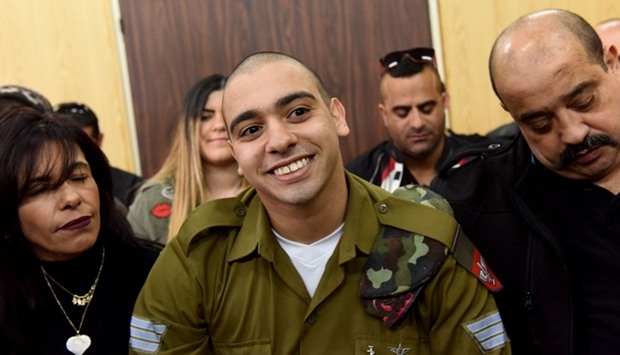Israeli Defence Minister Avigdor Lieberman recommended on Sunday that President Reuven Rivlin accept a request to pardon a soldier convicted of manslaughter for shooting dead a prone Palestinian assailant.
Rivlin had on October 19 received a request to pardon Elor Azaria and announced he would consider it as well as consult with the army and defence ministry.The shooting last year deeply divided Israeli society and led to an extraordinary rift between right-wing politicians who wanted to see Azaria released and top military brass, who harshly condemned his actions.
"I would like to ask that you accept Elor Azaria's request, and grant a pardon for the remain of his prison term," Lieberman wrote in a letter to Rivlin.
He said that Azaria acknowledged that shooting the Palestinian was "an operational mistake".
"People with much more senior positions than Azaria have been pardoned for acts similar or even more severe than Azaria," Lieberman said.
"I believe it's time to put an end to this affair that shook Israeli society, be merciful to the soldier and his family, and accept Elor Azaria's request to be pardoned," Lieberman said.
Rivlin, currently on his way to Spain for an official visit, would examine all the materials and recommendations relevant to the case upon his return, his office said in a statement.
A number of Israeli leaders, including Prime Minister Benjamin Netanyahu, have called for Azaria to be pardoned.
The March 2016 shooting in the occupied West Bank city of Hebron was caught on video by a human rights group and spread widely online.
It showed Abdul Fatah al-Sharif, 21, lying wounded on the ground, shot along with another Palestinian after stabbing and wounding a soldier, according to the army.
Some 11 minutes after the initial shooting, Azaria, a sergeant and military medic at the time, shot him in the head without any apparent provocation.
He said he had feared Sharif was wearing an explosive belt and could blow himself up -- a claim judges rejected.
On July 30, a military court turned down Azaria's appeal against his conviction for manslaughter and upheld an 18-month prison sentence, which he began serving on August 9.
In September, Israel's military Chief of Staff General Gadi Eisenkot reduced the term by four months.
Amnesty International has said Azaria's sentence does "not reflect the gravity of the offence".
The UN human rights office said it was an "unacceptable" punishment for "an apparent extra-judicial killing".
Azaria completed his mandatory three-year military service on July 20.

